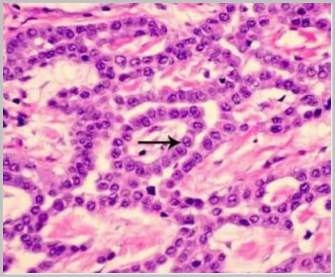Malignant pleural mesothelioma is a malignant tumor derived from the mesothelial cells of the pleural surface of the lung and the cells lining the lung cavity of the chest. Its incidence in males is three times that of females. The total reported cases per year in the United States is about 2700 per year and the death rate is about 14 per million each year. 80% of cases of patients with mesothelioma have documented exposure to asbestos. The association of mesothelioma with asbestos exposure and its fibers, i.e. crocidolite, amosite, and tremolite, has been well documented throughout the world. The majors associated with asbestos exposure are cement manufacturing, railroad repair, insulation, auto brake linings, paper milling, roofing, building construction and ceramics.
How asbestos causes mesothelioma to develop is not known, however, researchers have found some chromosome alterations and loss of chromosome 22. Simian virus 40 has been suggested to play a role in the tumor’s development. It is believed that the accumulation of asbestos causes repeated injury to the mesothelial cells and chronic inflammation. The cells undergo reactive changes and tumor growth develops. Mesothelioma appears long after the exposure to asbestos. It may be as short as 20 years after exposure, but the average latency period after exposure is 44.6 years.
Symptoms of Malignant Pleural Mesothelioma

It is important to remember that signs and symptoms of mesothelioma might not occur until decades after the asbestos exposure.
Early Pleura Affected Signs:
- Fatigue and weakness
- Chest pain
- Shortness of breath
- Coughing or wheezing
- Coughing up blood
Later Stage Abdomen Tumor Signs:
- Unexplained weight loss
- Bowel difficulties
- Stomach mass and pain
Other signs can be fever, jaundice, blood clots, organ bleeds, and fluid buildup in organs and lungs. The tumor growth may encase the entire lung and invade the lung, and the chest wall. It may also extend into the esophagus, the veterbra of the spine and into the nerves under the arms. It may also involve major veins. Some patients may present with findings of tumor spread outside the lung cavity and have swelling of the head and neck or spread of the tumor to the spinal cord. Few patients may have no symptoms.
If any of these signs and symptoms are present, see a healthcare provider immediately for screening. The earlier that mesothelioma is found, the better the chances for survival and higher quality of life.
Prognosis of Malignant Pleural Mesothelioma
The following studies may be ordered by the physician: chest radiograph, CT scan of the chest, MRI of the chest and a PET scan. The diagnosis of mesothelioma is based upon the result of cytology studies of the pleural fluid and biopsy of the tumor with examination by a pathologist who determines which type of mesothelioma is present i.e. sarcomatous or spindle cell, desmoplastic, deciduoid, epithelial with squamous differentiation and small cell types. The tumors are usually positive for the following markers: calretinin, WT1 and cytokeratin 5/6. Treatment is by surgical excision, and combined chemotherapy and radiotherapy. Prognosis is dependent on the stage of the disease. The prognosis for males is worse than females. Tumors of the spindle cell and desmoplastic subtypes have shorter survival rates.
Treatment of Mesothelioma
There are several different available options for treating mesothelioma. There are some surgical options, including radiation, immunotherapy, and chemotherapy. This is all of the suggested medical options; however there are those that will assist the treatment options with alternative treatments. Talking with a medical professional can give a wider range of options with those that are specifically for the stage of cancer that the mesothelioma has progressed to.
•Surgery – This involves removing the lining to the chest wall and lungs.
•Radiation – This is often given with chemotherapy to eradiate cancer cells in the chest wall and lung area. Mesothelioma has been shown to be resistant to sole radiation treatments.
•Immunotherapy – Plagued with side effects that many find intolerable, immunotherapy tries to increase the body’s immune response to the cancer cells.
•Chemotherapy – Best option choice in studies, this has side effects like nausea and vomiting. However, studies have shown an improved quality of life and increase in lung function after chemotherapy treatments with mesothelioma patients.
Some will try treating with non-medically approved forms of alternative therapy such as acupuncture and herbal remedies. Clinical professionals will look at these alternative therapies as interruptions to medically necessary procedures. Best bet? Cover all the options and do medically proven treatments with the alternative.

